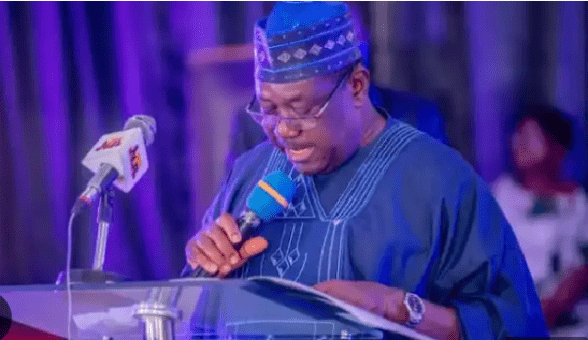The Federal Government on Wednesday blamed the rising incidents of attacks by terrorists and bandits across Nigeria on the recent pronouncements by President Donald Trump of the United States and other top officials of his government on the security situation in Nigeria.
The Secretary to the Government of the Federation (SGF), Senator George Akume, who made this assertion at a media chat in Abuja, said that by the redesignation of Nigeria as a Country of Particular Concern and the subsequent threat of military action against the country, the US government has inadvertently provoked these violent groups and emboldened them to wreck mire havoc while asking in the euphoria of international narratives of their activities.
Akume claimed that the insurgency structures in Nigeria had been “significantly degraded” before the latest wave of commentary from Washington, adding that such statements, though perhaps well-intentioned, had the unintended effect of emboldening extremist groups.
He said that Nigeria needed from global partners, especially the United States, at this time was collaboration through intelligence, technology and equipment, not public labels that distort the country’s security realities.
Akume, a former Governor of Benue State, dismissed the allegation that a Christian Genocide was ongoing in Nigeria, describing the narrative as inaccurate and dangerous, as no credible international organisation had ever classified the crisis in Nigeria as genocide against any group.
He argued that the current portrayal of the crisis as ‘genocide against Christians’ fuels religious tension, emboldens extremist and criminal factions seeking to exploit sectarian narratives.
In addition, he said, the situation creates diplomatic friction and undermines Nigeria’s longstanding efforts to build constructive international security partnerships.
According to Akume, both the Boko Haram and ISWAP groups have historically attacked both churches and mosques, killing Christians, Muslims and traditionalists, while the bandits operating in the North-West region were primarily a criminal enterprise with economic motivations rather than targeting any religion.
The SGF traced the Boko Haram insurgency to ideological currents and radicalisation of members of the group under Mohammed Yusuf, whose death in the hands of security operatives triggered unbridled violence in Borno State. He said that the group later transformed to Islamic State West Africa Provinces (ISWAP) under Abubakar Shekau, following its pledge of allegiance to ISIS in 2015.
Akume said that the insurgency gained more potency following the collapse of Libya and instability in Egypt, as these crises opened arms trafficking corridors for extremist groups.
According to him, small arms and light weapons flowed through Al-Qaeda-linked AQIM routes into the Sahel and Nigeria, boosting the operational capacities of Boko Haram, ISWAP and later, armed banditry networks.
The SGF reaffirmed Nigeria’s commitment to strengthening diplomatic relations with the United States on the basis of mutual respect, shared democratic values and a joint responsibility to enhance regional and global stability.
He appealed to Nigerians across political, ethnic and religious divides to unite against violent extremism, saying “now is the time to speak with one strong and united voice to confront a common enemy and eradicate terrorists, bandits and insurgents from our national borders.”
















